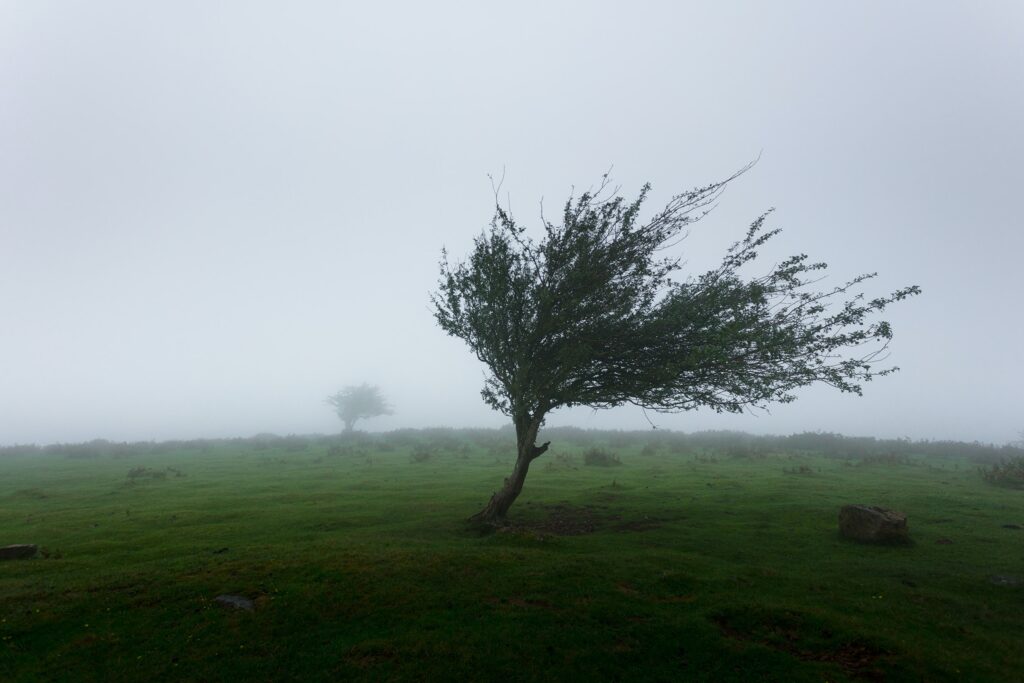On Monday, when my friend arrived on my doorstep like a leaf blown in by the wind, I asked if she had cycled through the inclement weather. ‘No,’ she said simply, shaking the drops of rain from her waterproof jacket, ‘I walked. I just felt like I needed some fresh air.’

I was impressed. Outside, the wind was whirling; rain hurling itself upon the windows. Yet, I also knew that she had a point. November is seldom viewed as a time to enjoy the outdoors, but perhaps it should be.
A blustery day
Sitting inside, perhaps with the heating on, the air quickly becomes stale. Artificial light, to combat the gloomy skies without, is harsh on our eyes. Through attempting to overcome the ‘unpleasant’ conditions outside, we often make equally unpleasant conditions within if we don’t spend at least part of the day in the natural world.
That same day, I was suffering horribly from brain fog – a sort of listless state where one’s brain literally feels like it is shrouded in a heavy mist. Clear thinking is impossible and a headache hovers at the edges. Reflecting on my friend’s brave venture through the elements, I wondered if a blast of fresh air might help me. So, I took the dog out to the back garden, wrapped myself up well and sat in the shed with the door wide open to throw her ball.
We live at the top of a hill on the South Downs, so the wind has no obstacle before my back garden. At times, I thought the doors would be taken off their hinges or that Hermione might be lifted into the air. The sheer noise of the wind was deafening. But it was also exhilarating.

Image: Khamkeo Vilaysing on Unsplash
Forty-five minutes of its buffeting left Hermione exhausted and happy and me completely free of my fog. The wind’s crazy, tousling madness had blown my lethargy clean away.
Learning to love the inclement
As the week progressed, these conditions continued, and I had to take the dog to the park and to exercise in the garden. Properly dressed, I discovered to my delight, that these expeditions into the rather wild elements were far from miserable. In fact, they were simply exhilarating.
For most of my life, November has been the month I dreaded: the dark annexing more and more of the day; damp and cold insinuating itself into every crevice. It was simply to be endured until the more festive month of December. But this year, I am seeing its virtues.
I am not the only one. John Clare’s poem, ‘November’ is a wonderful homage to this unpredictable and wild month. Below is a segment of the poem:
Sybil of months, and worshipper of winds, I love thee, rude and boisterous as thou art; And scraps of joy my wandering ever finds Mid thy uproarious madness—
I too have found ‘scraps of joy … mid thy uproarious madness’, because being in these elemental conditions awakens something elemental in ourselves. A student of mine said that he likes nothing better than walking in nature in torrential rain. I now think I know why.
Weathering the storm
When my sister’s children were young, she lived some distance from the school and so took them there by car. My niece was about ten years old when she first walked to school in the rain. She thought it was brilliant.

Image: Marcus Woodbridge on Unsplash
I’m not suggesting that we trudge through rain at every opportunity (and certainly not without appropriate gear) but dealing with literally stormy weather can help us learn to deal with the metaphorical kind. Resilience, like everything else, is learned. We cannot acquire it overnight. Through introducing ourselves to more manageable difficulties, surviving or even thriving through them, we adapt to change and complications more readily. This is at the heart of the Wim Hof cold method. When you can sit in an ice bath for several minutes, there is probably not much than will faze you.
Further, tackling difficult conditions reminds us that life is difficult. We should not expect some ideal that is far from reality. Which then begs the question: What is ideal?
Perception is all
What is perfect for you is unlikely to be perfect for me. My illness means that temperatures over 70 degrees cause me to melt and my faculties to go into sleep mode; for others, it is approaching the sublime.
Further, it is the way that we perceive that colours our judgment. We, as humans, tend to view rain, wind and cold as bad weather. As the brilliant writer, Henry Beston points out, that is our mistake. Nature has no interest in our categories. When considering the more ‘negative’ elements in nature, he says, ‘It is true there are some grim arrangements. Beware of judging them by whatever human values are in style. As well expect Nature to answer to your human values as to come into your house and sit in a chair.’ (The Outermost House)
We are in nature and of nature and learning to accept our rather microscopic position in the cosmos is generally advisable for good mental health. We no more control the weather than King Cnute managed to control the waves. Far better to acknowledge our place than rage against it.
Indeed, if we can accept things for what they are rather than what we want them to be, we can often see beauty and find joy in even the most stormy weather.
Today, the wind has died down and the sun is brilliant. I loved our trip to the park and sitting, warming in the sun. It won’t last, of course, but I shall enjoy it while it does. And later? I shall put on my warm coat and wellies and enjoy that day’s manifestation.
